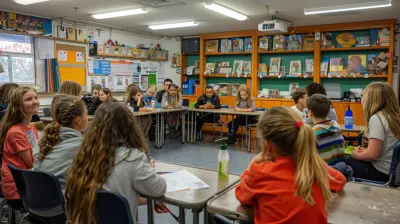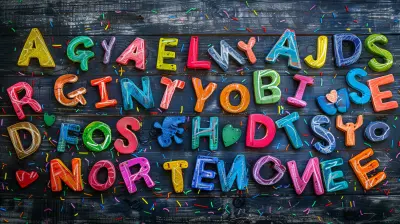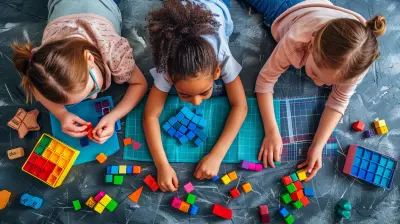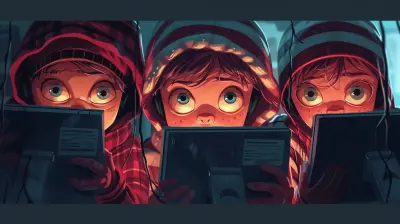How to Build Curiosity and Lifelong Learning Habits
4 March 2025
Curiosity — that spark that leads us to ask questions, explore the unknown, and dive into endless realms of knowledge. It’s the engine behind every discovery, and it’s what keeps us learning throughout our lives. But how do you nurture that spark, especially in a world filled with distractions and information overload? And more importantly, how do you turn curiosity into a habit that fuels lifelong learning?
In this article, I’m going to walk you through the steps to build curiosity and develop habits that will keep you learning for a lifetime. Think of it as throwing logs on your internal “curiosity fire” — you’ll be feeding that flame for years to come.
Why Is Curiosity Important?
Before we dive into the "how," let’s talk a little about why curiosity matters. Curiosity isn't just about asking questions or wanting to know more. It goes much deeper than that.Curiosity is essential for a few reasons:
- Keeps the mind sharp: By constantly seeking out new information, you’re exercising your brain. It’s like going to the gym but for your mind.
- Leads to personal growth: When you're curious, you’re more likely to step outside of your comfort zone and try new things. That’s where growth happens.
- Helps solve problems: A curious mind is a flexible mind, capable of looking at problems from different angles and finding creative solutions.
- Makes life interesting: Let’s be real. Life would be pretty boring without curiosity. It’s the spice that adds flavor to everyday existence.
Basically, curiosity is the driving force behind innovation and personal development. Without it, you’re just going through the motions.
Step-by-Step Guide to Building Curiosity and Lifelong Learning Habits
1. Adopt a Growth Mindset
If you want to build curiosity, the first thing you need to work on is your mindset. Specifically, you need to adopt a growth mindset.A growth mindset is the belief that you can improve and learn new things over time. It’s the opposite of a fixed mindset, where people believe their abilities are static and unchangeable.
When you believe that you can grow, you naturally become more curious. You start to see challenges as opportunities to learn rather than obstacles. You stop being afraid of failure because failure is just part of the learning process.
How do you adopt a growth mindset? Start by replacing thoughts like “I can’t do this” with “I can’t do this yet.” The power of that one little word — yet — can change your entire outlook.
> Pro Tip: Surround yourself with people who have a growth mindset. Their attitude will rub off on you.
2. Ask More (and Better) Questions
Curiosity begins with questions. The more questions you ask, the more you’ll learn. But not all questions are created equal. If you want to build lifelong learning habits, start by asking better questions.Instead of asking surface-level questions like, “What is this?” ask deeper questions like, “Why does this work the way it does?” or “How could this be improved?”
Deeper questions lead to deeper learning. They force you to engage with the material on a more meaningful level.
Also, don’t be afraid to ask “stupid” questions. Spoiler alert: There’s no such thing. Some of the most profound discoveries started with simple, seemingly obvious questions. So, ask away!
3. Embrace the Unknown
One of the biggest barriers to curiosity is fear of the unknown. We tend to stick to what we know because it’s safe and comfortable. But true curiosity thrives when you step into uncharted territory.Think about it like this: If you only ever explore the familiar, how can you expect to learn something new?
Start by embracing the unknown in small ways. If you normally read books on a specific topic, try reading something completely different. If you usually watch the same type of TV shows, switch it up. The goal is to get comfortable with being uncomfortable.
Over time, you’ll start to see the unknown not as something to be feared but as something to be explored.
4. Cultivate a Beginner’s Mind
In Zen Buddhism, there’s a concept called Shoshin, or “beginner’s mind.” It means approaching every situation as if you were a complete novice, even if you’re an expert.Why is this important? Well, experts often fall into the trap of thinking they know everything. This can stifle curiosity because they stop asking questions or looking for new perspectives.
By cultivating a beginner’s mind, you’ll stay curious even in areas where you already have knowledge. You’ll remain open to new ideas and insights that you might have otherwise overlooked.
So, the next time you’re learning something, try to approach it with fresh eyes, like you’re hearing about it for the first time.
5. Follow Your Interests (and Let Them Change)
One of the best ways to build curiosity is by following your natural interests. When you’re genuinely interested in something, learning feels less like a chore and more like a passion.But here’s the thing: It’s okay if those interests change over time. In fact, they should! The world is too big and too fascinating to stick to one thing forever.
Don’t be afraid to pivot when your curiosity leads you in a new direction. The key is to follow the trail of your curiosity wherever it takes you.
> Curiosity is like a compass — it will guide you, but you have to be willing to follow.
6. Make Learning a Daily Habit
Curiosity doesn’t thrive in a vacuum. You have to nurture it by making learning a daily habit.This doesn’t mean you need to spend hours each day studying. It can be as simple as reading a few pages of a book, watching an educational video, or listening to a podcast on your commute.
The point is to integrate learning into your daily routine so that it becomes second nature. Over time, this habit will strengthen your curiosity and keep it alive.
A great way to do this is by setting small, achievable goals. For example, aim to learn one new thing every day. It could be as small as a new word or as big as a new skill. The important thing is that you’re consistently feeding your curiosity.
7. Surround Yourself with Curious People
Ever notice how being around enthusiastic, curious people makes you feel more interested in things? It’s contagious!Curiosity tends to breed more curiosity. When you surround yourself with people who are always asking questions, exploring new ideas, and learning, you’ll naturally start to do the same.
Start by seeking out communities or groups that share your interests. Whether it’s online forums, book clubs, or meetups, being in an environment where curiosity is encouraged will help you stay motivated.
8. Embrace Failure as a Learning Opportunity
Here’s a truth bomb: You’re going to fail. And that’s okay. In fact, it’s more than okay — it’s essential for learning.Failure often gets a bad rap, but it’s one of the best teachers out there. When you fail at something, you’re forced to confront what went wrong and figure out how to improve.
Embrace failure as part of the learning process. The key is not to let it discourage you but to use it as fuel for your curiosity. Ask yourself, “What can I learn from this?” and “How can I do better next time?”
The more comfortable you get with failure, the more curious you’ll become. You’ll start to see every setback as an opportunity for growth.
9. Stay Curious About the World Around You
Sometimes, we get so wrapped up in our routines that we forget to take a step back and simply observe the world around us. But the world is full of fascinating things if you just take the time to notice them.Make it a habit to stay curious about your surroundings. This could be as simple as noticing the architecture in your neighborhood, wondering about the history of a building, or asking yourself how something works.
By staying curious about the everyday world, you’ll train your brain to look for new and interesting things in all areas of life.
The Lifelong Benefits of Curiosity
By now, you’ve probably realized that building curiosity and lifelong learning habits isn’t something that happens overnight. It’s a journey. But it’s a journey well worth taking.Here’s why:
- You’ll never stop growing: Lifelong learners are always evolving. Every new piece of information adds a layer to your understanding of the world.
- You’ll stay mentally sharp: Studies have shown that continued learning helps prevent cognitive decline as we age. Keeping your brain active is one of the best ways to stay sharp.
- You’ll adapt to change more easily: The world is constantly changing, and those who are curious are better equipped to adapt to those changes. Lifelong learners are resilient, flexible, and open to new possibilities.
In short, curiosity is the key to a fulfilling, dynamic life. And the best part? There’s no limit to how much you can learn.
Final Thoughts
Building curiosity and lifelong learning habits isn’t about being a genius or having a high IQ. It’s about having the right mindset, asking questions, and staying open to new experiences. The more you nurture your curiosity, the more it will grow — and the more you’ll grow with it.So, start today. Ask questions. Explore the unknown. Follow your interests. And most importantly, never stop learning.
all images in this post were generated using AI tools
Category:
Skill DevelopmentAuthor:

Madeleine Newton
Discussion
rate this article
17 comments
Ella McFarland
Thank you for this insightful article! I appreciate the practical tips on fostering curiosity and developing lifelong learning habits. It's a reminder that nurturing our innate curiosity can lead to endless growth. I'm excited to implement these strategies in my daily life!
April 5, 2025 at 8:58 PM

Madeleine Newton
Thank you for your kind words! I'm glad you found the tips helpful. Wishing you all the best on your journey of curiosity and lifelong learning!
Uriah Abbott
Ignite your passion for knowledge! Cultivating curiosity and lifelong learning transforms challenges into opportunities. Embrace each question, seek new experiences, and celebrate every discovery. Remember, the journey of learning is limitless—dare to explore, and grow endlessly!
April 2, 2025 at 2:19 AM

Madeleine Newton
Thank you for your inspiring comment! Embracing curiosity truly fuels our growth and transforms challenges into enriching experiences. Let's keep exploring together!
Noah McQuiston
Curiosity ignites learning; nurture it daily.
March 30, 2025 at 7:03 PM

Madeleine Newton
Absolutely! Cultivating curiosity is key to fostering a love for lifelong learning. Let's explore ways to nurture it daily!
Nala McClary
This article offers valuable strategies to foster curiosity and cultivate lifelong learning, essential skills for personal and professional growth.
March 30, 2025 at 5:30 AM

Madeleine Newton
Thank you! I'm glad you found the strategies valuable for fostering curiosity and lifelong learning. Your feedback is appreciated!
Evelyn McMillen
Fostering curiosity opens doors to endless possibilities; embrace learning as a lifelong adventure filled with joy!
March 25, 2025 at 7:16 PM

Madeleine Newton
Thank you! Embracing curiosity truly transforms learning into an exciting journey. Let's continue exploring together!
Fletcher Gibson
This article offers insightful strategies for fostering curiosity and lifelong learning. Embracing these habits can profoundly enhance personal and professional growth. Thank you!
March 22, 2025 at 9:50 PM

Madeleine Newton
Thank you for your kind words! I'm glad you found the strategies helpful for fostering curiosity and lifelong learning.
Gwen McCall
Curiosity is like chocolate: the more you have, the sweeter life gets!
March 21, 2025 at 9:39 PM

Madeleine Newton
Absolutely! Just like indulging in chocolate, nurturing curiosity truly enriches our experiences and fuels lifelong learning.
Cassian Navarro
Curiosity fuels growth—embrace it for lifelong learning success!
March 19, 2025 at 8:21 PM

Madeleine Newton
Absolutely! Embracing curiosity is key to continuous growth and learning. It opens doors to new ideas and experiences, fostering a lifelong passion for knowledge.
Zevan McKale
This article effectively emphasizes the importance of cultivating curiosity as a foundation for lifelong learning. It offers practical strategies that engage students actively, fostering intrinsic motivation. By creating an environment that values questions and exploration, educators can inspire a more profound love for learning.
March 19, 2025 at 12:52 PM

Madeleine Newton
Thank you for your insightful comment! I'm glad you found the strategies effective in fostering curiosity and intrinsic motivation in students. Creating a supportive environment for exploration is indeed key to inspiring a love for lifelong learning.
Gwen McCallum
Great tips! Curiosity fuels growth—start small and stay consistent.
March 18, 2025 at 5:42 AM

Madeleine Newton
Thank you! I'm glad you found the tips helpful. Consistency truly is key to nurturing curiosity and fostering lifelong learning!
Wynter Horne
Great article! Encouraging curiosity and lifelong learning is so important. Your insights provide practical tips that can inspire readers to nurture their thirst for knowledge. Keep up the excellent work!
March 17, 2025 at 5:25 AM

Madeleine Newton
Thank you so much for your kind words! I'm glad you found the tips helpful and inspiring. Lifelong learning truly makes a difference!
Lara McLaughlin
Curiosity fuels endless learning joy!
March 14, 2025 at 8:46 PM

Madeleine Newton
Absolutely! Curiosity truly is the spark that ignites a passion for lifelong learning.
Robert Hines
Curiosity is like a cat with a PhD in exploring! Embrace the whimsy of learning—every question is a key that unlocks a treasure chest of knowledge. Adventure awaits!
March 11, 2025 at 8:07 PM

Madeleine Newton
Thank you for your delightful insight! Embracing curiosity truly opens doors to endless learning adventures. Let’s all keep exploring!
Vera Simon
This article beautifully highlights the importance of fostering curiosity—an essential ingredient for lifelong learning and personal growth.
March 9, 2025 at 11:29 AM

Madeleine Newton
Thank you! I'm glad you found the article meaningful. Fostering curiosity truly is key to continuous growth!
Astrid Kane
This article offers a fascinating glimpse into fostering curiosity and lifelong learning! I’m particularly intrigued by the practical strategies mentioned. Embracing a mindset of exploration can truly transform our approach to knowledge. I can’t wait to implement these ideas and see how they reshape my learning journey!
March 8, 2025 at 12:57 PM

Madeleine Newton
Thank you for your thoughtful comment! I'm glad you found the strategies intriguing and inspiring. Best of luck on your learning journey!
Barrett
This article effectively highlights the critical role of curiosity in fostering lifelong learning. By encouraging questions and exploration, educators can cultivate a mindset that values continuous growth. Practical strategies mentioned provide valuable insights for both teachers and learners in this journey.
March 4, 2025 at 8:41 PM

Madeleine Newton
Thank you for your thoughtful feedback! I’m glad you found the article’s emphasis on curiosity and practical strategies valuable for fostering lifelong learning.
Noah Cannon
Fostering curiosity transforms challenges into opportunities, igniting a passion for lifelong learning and growth.
March 4, 2025 at 5:42 AM

Madeleine Newton
Thank you! Embracing curiosity truly does turn challenges into stepping stones for continuous growth.
MORE POSTS

Cooperative Learning Strategies for Group Activities

How Peer Feedback Can Be a Catalyst for Deeper Understanding

The Future of STEM Education in Colleges and Universities

How to Overcome the Fear of Speaking a New Language

Grammar Tips for Beginners: Simplifying Complex Rules

How to Teach Math as a Creative Process

The Importance of Diverse Voices in Media Literacy Education

Understanding the Role of Motivation in Student Learning: Research Insights

Teaching Kids to Spot Online Scams and Hoaxes

The Benefits of Collaborative Learning in Math Classrooms

How to Learn Faster: Science-Based Techniques for Skill Acquisition